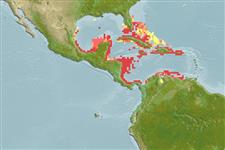>
Mugiliformes (Mullets) >
Mugilidae (Mullets)
Etymology: Joturus: Taken from the Greek letter "iota" = the least or in the very small quantity + Greek, oura = tail (Ref. 45335).
Eponymy: Esteban Pichardo (1799–1879) was a Cuban lexicographer-geographer who was, according to Poey, the ‘estimable auteur’ of Diccionario Provincial de voces Cubanos and Geografia de la isla de Cuba (he also recommended the vernacular name Joturo). (Ref. 128868), visit book page.
More on author: Poey.
Environment: milieu / climate zone / depth range / distribution range
экология
морской; пресноводный; солоноватоводный; катадромный (Ref. 51243); пределы глубины 10 - ? m. Subtropical; 22°C - 25°C (Ref. 36880); 30°N - 7°N, 112°W - 65°W
Central America: Bahamas and Greater Antilles and the Atlantic and Pacific slopes of Central America and Colombia.
Size / Вес / Возраст
Maturity: Lm ? range ? - ? cm
Max length : 61.0 cm TL самец/пол неопределен; (Ref. 9321); common length : 25.0 cm TL самец/пол неопределен; (Ref. 9321); наибольший вес (опубликованные данные): 3.3 kg (Ref. 40637)
Adults inhabit the upper reaches of rivers but enter brackish waters where spawning probably occurs. An important food fish in some areas. Herbivorous and scrapes algae from stones on the bottom with its fleshy lips, although sometimes eats prawns (Ref. 36880). Oviparous, eggs are pelagic and non-adhesive (Ref. 205). Migrate from the upper reaches of rivers during months of high rainfall to the sea-river transition zone to spawn (Ref. 13802).
Life cycle and mating behavior
половая зрелость | размножение | нерест | икра | Fecundity | личинки
Harrison, I.J., 1995. Mugilidae. Lisas. p. 1293-1298. In W. Fischer, F. Krupp, W. Schneider, C. Sommer, K.E. Carpenter and V. Niem (eds.) Guia FAO para Identification de Especies para lo Fines de la Pesca. Pacifico Centro-Oriental. 3 Vols. FAO, Rome. (Ref. 9321)
Статус Красного Списка МСОП (Ref. 130435: Version 2024-2)
Угроза для людей
Harmless
Использование человеком
рыболовство: рыболовство как средство для существования
дополнительная информация
инструменты
Специальные отчеты
Скачать в формате XML
ресурсы в Интернет
Estimates based on models
Preferred temperature (Ref.
123201): 27.5 - 28.4, mean 28 °C (based on 223 cells).
Phylogenetic diversity index (Ref.
82804): PD
50 = 1.0000 [Uniqueness, from 0.5 = low to 2.0 = high].
Bayesian length-weight: a=0.01175 (0.00555 - 0.02485), b=2.96 (2.79 - 3.13), in cm total length, based on LWR estimates for this (Sub)family-body shape (Ref.
93245).
Trophic level (Ref.
69278): 2.9 ±0.37 se; based on food items.
устойчивость к внешним воздействиям (Ref.
120179): средний (среднего размера), минимальное время удвоения популяции 1.4-4.4 года (Assuming tm=2).
Fishing Vulnerability (Ref.
59153): Moderate vulnerability (44 of 100).
Climate Vulnerability (Ref.
125649): Very high vulnerability (88 of 100).
Nutrients (Ref.
124155): Calcium = 80.4 [31.3, 190.5] mg/100g; Iron = 1.2 [0.6, 2.7] mg/100g; Protein = 19.4 [17.7, 21.0] %; Omega3 = 0.501 [0.239, 1.087] g/100g; Selenium = 18.3 [9.2, 38.9] μg/100g; VitaminA = 11.5 [3.4, 41.2] μg/100g; Zinc = 1.08 [0.76, 1.61] mg/100g (wet weight);
